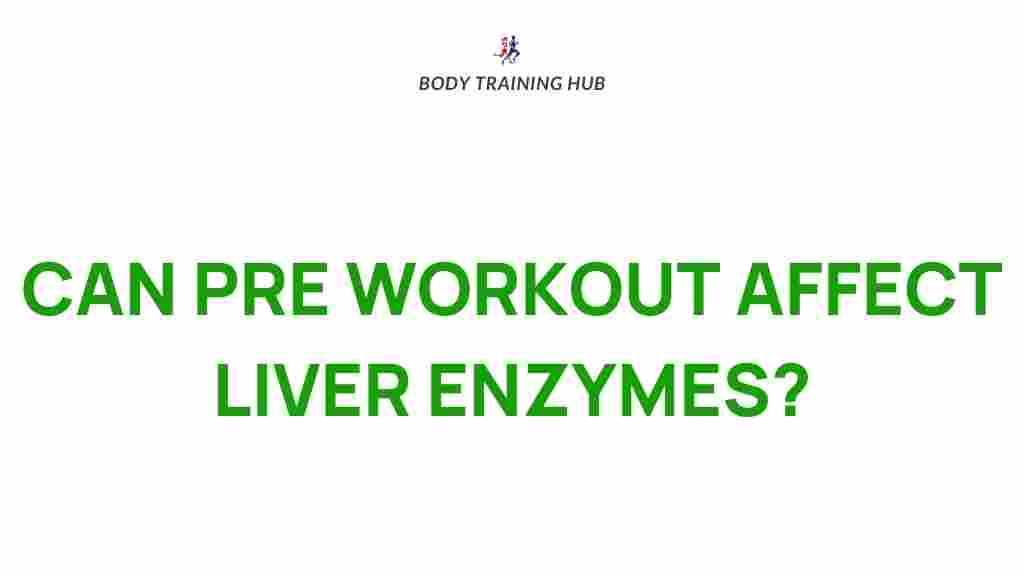Pre-workout supplements are a cornerstone for many fitness enthusiasts looking to amplify their performance and achieve their goals. However, understanding their impact on liver enzymes is crucial for making informed decisions about their usage.
In this article, we will explore the relationship between pre-workout supplements and liver health, breaking down the science, risks, and best practices to ensure your fitness journey stays safe and effective.
The Effects of Pre-Workout on Liver Enzymes
Pre-workout supplements are often formulated with a blend of ingredients like caffeine, beta-alanine, creatine, and various amino acids to boost energy, endurance, and focus. While effective, their influence on liver enzymes can be a concern if used improperly.
Your liver plays a vital role in metabolizing substances, including the compounds found in pre-workout supplements. Elevated liver enzyme levels can signal stress or damage to the liver, which underscores the importance of understanding these effects.
What Are Liver Enzymes?
Liver enzymes, such as ALT (alanine transaminase) and AST (aspartate transaminase), are proteins that help the liver perform essential functions. Elevated levels often indicate that the liver is under strain, which can be caused by various factors including supplement use.
Ingredients in Pre-Workout That May Affect Liver Enzymes
- Caffeine: High doses can place stress on the liver, particularly when consumed frequently.
- Niacin: Often included for its “flush” effect, excessive intake may impact liver health.
- Artificial Sweeteners: Some sweeteners used in pre-workout powders may contribute to metabolic stress.
- Unregulated Additives: Proprietary blends may include substances that challenge liver function.
How to Safely Use Pre-Workout Supplements
To minimize the impact of pre-workout supplements on liver enzymes, it’s essential to adopt safe practices. Below are guidelines to help you enjoy the benefits without compromising your health.
1. Choose High-Quality Products
Not all pre-workout supplements are created equal. Opt for products from reputable brands with transparent labeling and third-party testing. Look for certifications like Informed-Choice or NSF Certified for Sport.
2. Monitor Dosage
Stick to the recommended dosage on the label and avoid the temptation to “double up” for more pronounced effects. Excessive intake is one of the leading causes of liver stress from supplements.
3. Take Breaks
Incorporate off-cycles where you stop using pre-workout for a few weeks to allow your liver to recover and reset. This strategy helps prevent long-term strain.
4. Stay Hydrated
Proper hydration supports liver function and aids in metabolizing the ingredients in pre-workout formulas. Aim for at least 8–10 glasses of water daily.
5. Consult a Healthcare Professional
If you have existing liver conditions or are on medications, consult your doctor before adding pre-workout supplements to your routine.
Recognizing Symptoms of Liver Stress
It’s important to recognize the signs of liver stress or damage, which may include:
- Persistent fatigue
- Yellowing of the skin or eyes (jaundice)
- Dark urine
- Abdominal pain, particularly in the upper right quadrant
If you notice any of these symptoms while using pre-workout supplements, discontinue use immediately and seek medical advice.
What Does Research Say?
While limited, some studies have evaluated the effects of pre-workout ingredients on liver health. Research indicates that moderate use is generally safe for healthy individuals, but overuse or combining multiple supplements can elevate liver enzymes. For a detailed look at supplement safety, visit NCBI.
Key Findings:
- Caffeine in moderate amounts is well-tolerated but excessive doses may lead to increased ALT levels.
- Niacin, while beneficial in small amounts, can cause liver toxicity when consumed in high concentrations.
- Long-term effects of artificial sweeteners and unregulated additives require further investigation.
Troubleshooting Pre-Workout Side Effects
If you suspect that your pre-workout supplement is affecting your liver, here are steps to mitigate the impact:
1. Switch to a Cleaner Formula
Choose pre-workouts with minimal ingredients and no proprietary blends to reduce potential irritants.
2. Incorporate Liver-Supporting Foods
Foods like leafy greens, garlic, and turmeric can aid liver health. Incorporate these into your diet regularly.
3. Limit Alcohol Intake
Combining alcohol with pre-workout supplements can amplify liver strain. Reduce or eliminate alcohol consumption during supplement cycles.
Final Thoughts: Balancing Fitness and Health
Pre-workout supplements can be an effective tool for enhancing workouts, but their potential impact on liver enzymes cannot be ignored. By choosing high-quality products, adhering to recommended dosages, and monitoring your health, you can enjoy the benefits without compromising your well-being.
For more tips on safe supplement use, check out our complete guide to fitness supplements.
Remember, your fitness journey should always prioritize health above all else. Use pre-workout responsibly, and your liver will thank you!
This article is in the category Nutrition Fundamentals and created by BodyTraining Team
